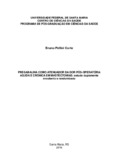| dc.creator | Corte, Bruno Pellini | |
| dc.date.accessioned | 2019-08-02T18:10:41Z | |
| dc.date.available | 2019-08-02T18:10:41Z | |
| dc.date.issued | 2016-08-12 | |
| dc.identifier.uri | http://repositorio.ufsm.br/handle/1/17688 | |
| dc.description.abstract | Chronic post-operative pain (DCPO) is a possible consequence of the surgical act, and occurs after many different procedures. There is a high prevalence of it on patients submitted to mastectomy, both partial and total, with negative consequences to their quality of life. Many risk factors were associated, although its development mecanism is not entirely elucidated yet. A multimodal approach has been preconized for the optimization of the treatment, which includes opting for minimally invasive surgical techniques or with nerve preservation and the use of adjuvant drugs like gabapentinoids, aiming reduction of opioids dosage and rediction of DCPO. The present study evaluated the effect of pregabaline on the reduction of post-operative pain and prevention of chronic post-operative pain on mastectomies, compared to a placebo control group. The patients were randomly allocated into two groups. The first (Group Pregabaline) received 150mg of pregabaline orally starting the night before the surgery and continued for 14 days; the second (Group Placebo) received similar capsules containing placebo. Both were submitted to the same anesthetic technique and post-operative analgesic regimen. Pain was evaluated through visual numeric scale (ENV) in 24 hours, 3 and 6 months after the surgery. The morphine consumption was also registered on the first 24 hours after the surgeries and the anxiety levels were measured through the HADS scale on the first 24 hours and after three and six months. The groups were similar regarding demographic data. There was no difference on the incidence of pain on the first 24 hours, after three and six months of the procedures, although there was a significative reduction on the morphine consumption on the first 24 hours on the group Pregabaline. There was no significant difference on the anxiety levels. In this study, the use of pregbaline on the perioperative period did not demonstrate significant reduction on the incidence of chronic post-operative pain, although demonstrated a significant reduction on the consumption of opioids on this period. | eng |
| dc.language | por | por |
| dc.publisher | Universidade Federal de Santa Maria | por |
| dc.rights | Attribution-NonCommercial-NoDerivatives 4.0 International | * |
| dc.rights.uri | http://creativecommons.org/licenses/by-nc-nd/4.0/ | * |
| dc.subject | Pregabalina | por |
| dc.subject | Dor crônica pós-operatória | por |
| dc.subject | Mastectomias | por |
| dc.subject | Pregabalin | eng |
| dc.subject | Chronic post-operative pain | eng |
| dc.subject | Mastectomies | eng |
| dc.title | Pregabalina como atenuador da dor pós-operatória aguda e crônica em mastectomias: estudo duplamente encoberto e randomizado | por |
| dc.title.alternative | Pregabaline as attenuator of acute and chronic post-operative pain in mastectomies: randomized double-blind trial | eng |
| dc.type | Dissertação | por |
| dc.description.resumo | Dor crônica pós-operatória (DCPO) pode ocorrer em diversos tipos de procedimentos cirúrgicos, tendo alta prevalência em pacientes submetidas a cirurgias de mama, com consequências negativas para a qualidade de vida das mesmas. Muitos fatores de risco têm sido associados, porém seu mecanismo de desenvolvimento ainda não está bem elucidado. Uma abordagem multimodal tem sido preconizada para otimização do tratamento, desde a opção por técnicas cirúrgicas minimamente invasivas ou com preservação de nervos até a utilização de fármacos adjuvantes, como os gabapentinoides, buscando menor utilização de opioides e redução da incidência de DCPO. O presente estudo avaliou o efeito da pregabalina na redução da dor pós-operatória e prevenção da dor crônica em mastectomias, em comparação com grupo controle. As pacientes foram alocadas em dois grupos aleatoriamente. O primeiro grupo (Grupo Pregabalina) recebeu pregabalina 150mg administrada via oral por 14 dias, iniciada na noite anterior à cirurgia; o segundo grupo (Grupo controle) recebeu cápsulas semelhantes contendo placebo. Ambos receberam a mesma técnica anestésica e de analgesia pós operarória. A dor foi avaliada através de escala numérico-visual (ENV) 24 horas, 3 e 6 meses após a cirurgia. Também foi registrado o consumo de morfina nas primeiras 24 horas e os níveis de ansiedade pela escala de ansiedade hospitalar (HADS) nas primeiras 24 h, 3 e 6 meses. Os dois grupos foram semelhantes em relação aos dados demográgicos. Não houve diferença na incidência de dor nas primeiras 24 h, após 3 e 6 meses do procedimento, porém houve redução significativa no consumo de morfina nas primeiras 24 horas do procedimento no grupo Pregabalina. Não houve diferença significativa entre os níveis de ansiedade. No presente estudo, o uso de pregabalina no período perioperatório não demonstrou redução significativa na incidência de dor crônica pós-operatória, porém reduziu o consumo de opioides das pacientes nesse período. | por |
| dc.contributor.advisor1 | Menezes, Miriam Seligman de | |
| dc.contributor.advisor1Lattes | http://lattes.cnpq.br/8746728488629971 | por |
| dc.contributor.referee1 | Sakata, Rioko Kimiko | |
| dc.contributor.referee1Lattes | http://lattes.cnpq.br/9796401471904195 | por |
| dc.contributor.referee2 | Jobim, Flavio Cabreira | |
| dc.contributor.referee2Lattes | http://lattes.cnpq.br/2111504371983515 | por |
| dc.creator.Lattes | http://lattes.cnpq.br/1894547443550511 | por |
| dc.publisher.country | Brasil | por |
| dc.publisher.department | Medicina | por |
| dc.publisher.initials | UFSM | por |
| dc.publisher.program | Programa de Pós-Graduação em Ciências da Saúde | por |
| dc.subject.cnpq | CNPQ::CIENCIAS DA SAUDE::MEDICINA | por |
| dc.publisher.unidade | Centro de Ciências da Saúde | por |



